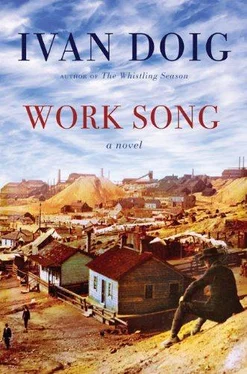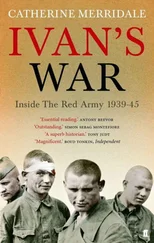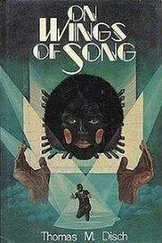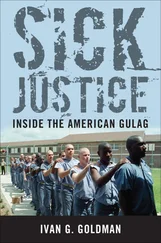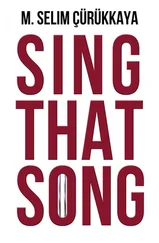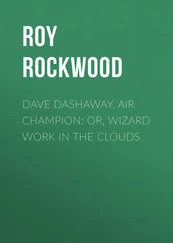Only barely assuaged, Sandison steamed on into the room, took charge of his chair, and wheeled it around to face me. Lately he seemed even more testy than usual. “Something’s not quite right around here, and for once I don’t just mean the library. You’ve got ears like a donkey when it comes to what’s going on in this town. Catch me up.”
I hesitated. Saying anything about the rising resolve of the miners’ union might brush too close to the fact of the sessions in the basement. I chose to concentrate on the Wobblies and recited the gossip about the arrival of phantom operatives to poach membership from the miners’ union.
“Outsiders,” Sandison pronounced flatly. “They’re always trouble.” With that, he heaved himself out of the chair and marched over to the stained-glass window to broodily peer out as if watching for trouble to come.
RUSSIAN FAMINE WAS FLYING UP the top steps when I went to the back staircase with the book list for him to deliver to the newspaper office. For a minute I stood watching, not daring to interrupt the dizzying ballet on the stairs. As before, the scissor-thin legs flashed up the steps three and almost four at a time, then straddled the banister and rode gravity zip-zip-zip to the bottom. Reluctantly I called to him after one of these precipitous rides, and, shaking his thatch of hair as if coming awake, he trotted over to me.
“Has anyone ever told you, my young friend, you give new meaning to the word restless?”
“Huh-uh. You’re the only one who talks that way.”
I thought it best to walk him out of the building, lest he run into Sandison again. While we made our way through the standing ranks of books Rab and I had tallied, the turn of season was on my mind, with her impending departure back to the classroom, and, as adults always foolishly do, I asked Famine if he was ready for school to start.
The boy put on a long face. “Flunked is what I shoulda done. Hung on in Miss Rellis’s class. Now I’ll get some old biddy for a teacher.” He sent me a sideward look, his eyes as quick as the rest of him. “I maybe won’t be going to school too much longer anyway. Skinner says I’m in luck, the Hennessy bunch has its eye on me when they do any more hiring.”
That knifed through me. So much for my bright idea of having posted him to the almighty top floor, just for the summer, to watch for any message of a certain sort dispatched by the goons; true to its nature, Anaconda was ready to swallow him up.
“What does your uncle think?” I asked, afraid I knew the answer.
“He says it’s up to me.” Famine scuffed along, head down. “I don’t much want to, but a kid has got to eat.”
SO, things flew at me like that during those days; and the hours after work the fledgling lyricists of the Lyre Club were steadily ready to consume. “You’re quite a night owl again,” Grace waylaid me as I was about to hustle back to the library one of these times.
My spirits instantly shot upward. How good to have her popping out of the kitchen to trade small talk as she used to. “These evenings, though,” I responded in relief, “everyone involved is healthy enough not to require a casket.”
“That’s not bad-”
“-for a start, yes, yes, you needn’t remind me.” That drew nothing more from Grace; she just hovered in the hallway. The recent distance between us had shrunk to within reach. I chanced hopefully: “If you’re feeling daring, would you like to come with me tonight?”
She shook her head, but still made no move to let me by.
“Hoop and Griff, bless their incurably Welsh souls, have taken practically a proprietary interest in the song sessions,” I gabbed to break the silence.
Grace pinched her lip, restricting her response to a careful “Mmhmm.” I waited, willing her to find whatever words she needed to put us back on the good terms of Miners Day.
Finally she wound her hands in her apron and said:
“Rent day was three days ago, Morrie.”
Deflated, I paid up and exited into the night.
AT MY SECOND HOME, the library, once more the miners and wives and Rab and Jared and Hoop and Griff and I filed into the basement without the whole passel of us being hauled off for unlawful assembly. It was a critical night: by dint of my tugging and hauling, we had reached melody, in the steps of song construction. However, I was making scant progress by standing on the stage and humming famous melodies as illustration, and in frustration I bemoaned the auditorium’s lack of any means of musical accompaniment.
To my surprise, that put life in my audience. For once, there was unanimity in the knowing grins of everyone but me, even Jared and Rab.
It was left to the Cornishman to ask:
“Has thee not heard of the Butte Stradivarius?”
“I confess I have not.”
“Thee shall have that remedied.”
THE CONCERTINA, rapidly fetched and in Cornish hands, could produce any melody I could think of, and plenty more. The wheezebox, as I came to think of it, made my point that a good tune was essential to a good song.
“That completes the three parts of musical invention,” I announced exultantly as the last wheezy strains of “Camptown Races” wafted away into the plaster foliage atop the auditorium walls.
“Rhyme, rhythm,” I smacked my fist into my hand with each word, “and melody. Keep those in mind and the Hill and its union shall sing a work song to rival that of the angels in their airy labors.” (Or, in my mind and Jared’s, to challenge that infernally mocking ballad of pie in the sky.)
This was a proud moment, and the craggy miners who had manfully sat through nights of musical instruction now slapped their knees and batted their neighbors on the shoulders and shouted out, “Good job, Professor!”
I took a modest bow. “I have done my utmost, and now it is up to you. Appropriately enough, creating the right song will take work, don’t think it won’t,” I exhorted further. “Inspiration most often follows perspiration. Now, then,” I advanced to the lip of the stage and made a beckoning gesture to the group, “what ideas do I hear for that song?”
Discord ensued.
The Finns wanted something grand and sonorous, in the manner of a saga.
The Cornish wanted something brisk.
The Irish wanted something rollicking that would tear the hide off Anaconda.
The Welsh, who legitimately had music in their blood, were outnumbered and outshouted by the others, as usual in history.
The Serbs wanted something that dripped blood.
What the Italians wanted was not clear, but it was nowhere close to what the other nationalities had in mind.
Standing up there trying to referee the musical wrangle, I wondered what it took to get committed to a mental institution in Montana.
At last Jared dutifully climbed onto the stage beside me and in his best top-sergeant manner managed to institute some order.
“This is a start,” he took command of the chaos in an unarguable style Napoleon might have admired. “There are a few differences of opinion, but talk those over with each other, with your shift partners and anybody who can carry a tune, all right? We’ll sort out what’s promising and what isn’t, next time. After that, we’ll get the union delegates from each shift at every mine together, and settle on the best song.” Without breaking his cadence of being in charge he asked over his shoulder: “How many people does this place hold, Professor?”
“Hmm? Perhaps two hundred. But you can’t-”
“It’ll be the damnedest thing they ever heard on the top floor of the Hennessy Building,” Jared vowed with a fist, “our song when we get it. Folks will sing it in this town as long as there’s a chunk of copper left in the Hill.” He clapped his hands, once, sharply. “Now let’s go home and get to working on the work song, everybody.”
Читать дальше
